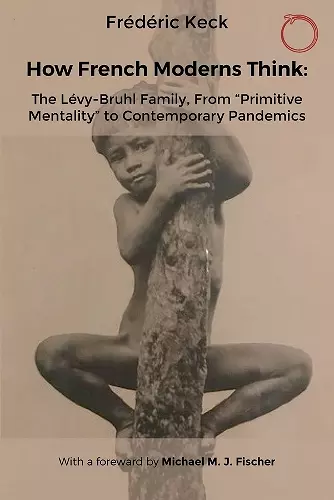How French Moderns Think
The Lévy-Bruhl Family, From “Primitive Mentality” to Contemporary Pandemics
Format:Paperback
Publisher:HAU Society Of Ethnographic Theory
Published:7th May '24
Should be back in stock very soon

This book explores the Lévy-Bruhl family's impact on 20th-century French social and political thought, highlighting their roles in addressing economic and health crises through generations of expertise and engagement.
How French Moderns Think explores the significant contributions of the Lévy-Bruhl family to social and political thought in 20th-century France. The narrative follows four generations, beginning with Lucien Lévy-Bruhl, who established the Institute of Ethnology at the University of Paris. His work laid the groundwork for understanding cultural differences and the complexities of human thought. The book emphasizes how these intellectual endeavors shaped the French approach to anticipating economic and health crises.
The story continues with Lucien's son, Henri, who founded the Institute of Roman Law, and his grandson, Raymond, a key figure in creating the National Institute of Statistics and Economic Studies. Each generation built upon the legacy of the previous one, contributing to the sociological tradition in France. The author, Keck, highlights how this family history sheds new light on philosophical debates concerning primitive mentality and the savage mind, suggesting that these concepts are intertwined with the ability to foresee unpredictable events.
In addition to the family’s academic achievements, the book delves into their political engagements, from the Dreyfus Affair to the role of the Minister of Armaments during World War I. Through this exploration, Keck examines the tension between the socialist ideals of justice and truth and the realities of the French colonial experience. Ultimately, How French Moderns Think presents a comprehensive view of how the Lévy-Bruhl family influenced both sociological thought and the broader understanding of societal challenges, particularly in the context of global health and technological advancements.
“Keck’s book is a breath of fresh air. He is willing to explore the depth of the issues raised by Lévy-Bruhl in the rise of sociology and anthropology after the Dreyfus Affair and the struggle against French anti-Semitism, and to go beyond terminological allergy towards the concepts of “primitive” and “mentality.” The argument that French social scientists have tried to understand catastrophic and “unpredictable” events highlights the insufficiency of a social scientific thought that restricted itself to modern conceptions of rationality and logic, and is increasingly important in today’s era of pandemics and global warming.” -- Ghassan Hage, author of "Alter-Politics: Critical Anthropology and the Radical Imagination"
“With a dizzying abundance of references, Keck demonstrates the breadth and versatility of Lévy-Bruhl’s interests. These placed him at the intersection of different fields of investigation, reflection and action, not only as a central intercessor at the crossroads of philosophy and the social sciences (still in the making at the time), but also of medicine and public health issues, which led him to take charge of a real politics of knowledge.” -- Pierre Macherey, author of "Hegel or Spinoza"
“Keck gives us a profound re-reading of Lucien Lévy-Bruhl’s life-long quest for “another thought” in the pursuit of an affective logic of signs and community, a knowledge by sentiment, which is also a semiotic of the accident – different from that of the state and its symbols – and entangled with the torn history of the French Third Republic, the Dreyfus trial, and the rootlessness of French colonial violence. Retracing the larger historical tapestry within which the realization of such a knowledge by sentiment could unfold, Keck stresses the border figure of “the sentinel,” a contingent being in between worlds, pointing us to the always uncertain possibilities of other futures and lives.” -- Stefania Pandolfo, author of "Knot of the Soul: Madness, Psychoanalysis, Islam"
ISBN: 9781914363023
Dimensions: 229mm x 152mm x 20mm
Weight: 454g
215 pages